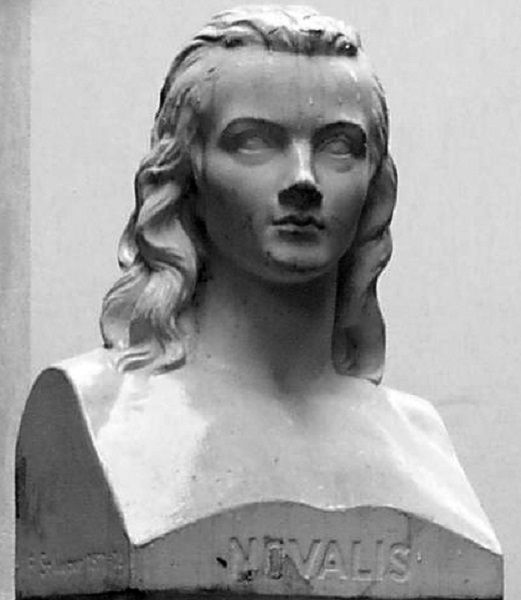Poem of the day. Novalis.
Uplifted is the stone --
And all mankind is risen --
We all remain thine own.
And vanished is our prison.
All troubles flee away
Thy golden bowl before,
For Earth and Life give way
At the last and final supper.
To the marriage Death doth call --
The virgins standeth back --
The lamps burn lustrous all --
Of oil there is no lack --
If the distance would only fill
With the sound of you walking alone
And that the stars would call
Us all with human tongues and tone.
Unto thee, O Mary
A thousand hearts aspire.
In this life of shadows
Thee only they desire.
In thee they hope for delivery
With visionary expectation --
If only thou, O holy being
Could clasp them to thy breast.
With bitter torment burning,
So many who are consumed
At last from this world turning
To thee have looked and fled,
Helpful thou hast appeared
To so many in pain.
Now to them we come,
To never go out again.
At no grave can weep
Any who love and pray.
The gift of Love they keep,
From none can it be taken away.
To soothe and quiet his longing,
Night comes and inspires --
Heaven's children round him thronging
Watch and guard his heart.
Have courage, for life is striding
To endless life along;
Stretched by inner fire,
Our sense becomes transfigured.
One day the stars above
Shall flow in golden wine,
We will enjoy it all,
And as stars we will shine.
The love is given freely,
And Separation is no more.
The whole life heaves and surges
Like a sea without a shore.
Just one night of bliss --
One everlasting poem --
And the sun we all share
Is the face of God.

Novalis was born in 1772 at the Oberverderstadt mansion in the Harz Mountains of Kurzsaken and is the descendant of the old noble family of Hardenberg. He studied at the Luther High School in Isleben, where he gained knowledge of rhetoric and ancient literature. Strongly influenced by Friedrich Schiller's artistic genius, in whom, as a law student, he listens to lectures in Jena, Novalis is inspired by transcendental idealism - so overcame his disgrace from the atrocities of the French Revolution. His spiritual experiences include the shock of the clash of reality with the life and artistic needs of the person. His encounters with Goethe, Herder and Jean Paul, as well as his friendship with Ludwig Tik, Schelling and the Schlegel brothers in Leipzig, contributed to this worldview. The first works of the poet, signed with the pseudonym Novalis, are titled "Pollen " (1798) in the Athenaeum magazine. In his unfinished novel about the legendary miners of Heinrich von Offtlingengen (1799-1800), drenched with mysticism and youthful sensuality, Novalis aims to combine poetry with religion to contribute to the emergence of a new "golden age." His ideal is the enlightened "dark" Middle Ages and the old Catholic church. Novalis' influence on German and world literature and culture is extremely strong. In his musical drama "Tristan and Isolda" (1859), Richard Wagner developed the motif of the night poet as beyond space for utopian life experiences. Novalis refers to the American transcendentalists, the European symbolists (the "blue bird") and the neo-romantics of the late 19th century. His remote influence is also evident in the poetry of the 20th century hermetic modernism, as well as in the early works of Hermann Hesse. A charitable change of reality and the establishment of inner harmony are possible, according to Novalis, only through a treasured "journey within oneself." The deep impulse to the afterlife is based on the idea that the poet - a priest and a prophet - is the highest authority of mankind, because he gives him the "blue flower" - a symbol of romantic poetry. The gentle and intimate "Hymns of the Night" (1799-1800), created in despair by the death of his fifteen-year-old bride, Sophie von Kun, are full of longing for the deliverance of death. The poet himself dies very young from pulmonary tuberculosis, possibly infected with his contact with the sick Friedrich Schiller.


I am amazed, baffled and impressed by not only your knowledge of literature, but also by your insight into the histories and underlying struggles, philosophies and motivations of the authors.
That is really all I can say. Love reading your posts, gem after gem.
Thank you very much.... well... I have a lot of free time to read :D
And we on Steemit are lucky you do! : )
A well chosen poem, and very informative literary biography. I'm sad to say my knowledge of poetry fizzles out before about 1880 (and even after that, rarely for non-English writers) so this is a valuable insight for me. Glad to have found your blog. Judging by some recent posts I'm sure there's a lot more you'll expose me to! Do you have a favourite poetic period or school in particular?
Hello @godflesh, thank you for sharing this creative work! We just stopped by to say that you've been upvoted by the @creativecrypto magazine. The Creative Crypto is all about art on the blockchain and learning from creatives like you. Looking forward to crossing paths again soon. Steem on!